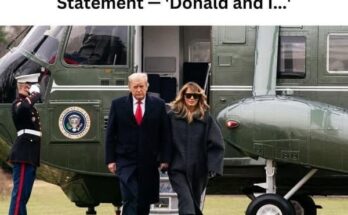Last Updated on September 12, 2025 by Grayson Elwood
In a striking announcement that has already sent ripples through the political world, former President Donald Trump declared this week that billionaire philanthropist George Soros and his network of organizations should be investigated under the federal RICO statute. The move, if pursued, could represent one of the most ambitious legal challenges against a private individual’s political influence in modern American history.
The RICO Act — short for the Racketeer Influenced and Corrupt Organizations Act — was originally designed to dismantle organized crime. Trump’s statement, however, suggests that its scope should be broadened to examine how wealthy individuals and their networks may shape movements, protests, and media narratives in the United States.
Trump’s Announcement
Speaking before supporters, Trump accused Soros of funding and training groups that, in his view, have contributed to unrest and instability across the nation.
“We will not allow billionaires to destabilize our nation by funding chaos,” Trump declared. “This is not about free speech or philanthropy — this is about accountability.”
His comments were met with loud applause, particularly from those who believe that large-scale influence networks wield too much control over public life without sufficient oversight.
Why the RICO Act Matters
To understand the weight of Trump’s words, it’s important to understand the law he referenced. Enacted in 1970, the RICO Act was originally aimed at breaking up mafia families and organized crime syndicates. Its power lies in its ability to prosecute not just the individuals who commit crimes, but also the leaders who orchestrate them from behind the scenes.
Over the years, RICO has been applied far beyond the mafia. It has been used to dismantle drug cartels, target corrupt unions, and even prosecute white-collar financial schemes. The idea behind Trump’s statement is that if political influence networks operate like an organized system — with money, training, and coordination — then RICO might be a tool to investigate them.
The Bigger Picture
George Soros has long been a controversial figure in global politics. Through his Open Society Foundations and related groups, he has donated billions to causes ranging from education and healthcare to democracy-building initiatives worldwide. Supporters argue that his philanthropy strengthens open societies and human rights. Critics, however, claim his funding shapes protests, advocacy campaigns, and narratives that align with his worldview.
Trump’s announcement signals a new front in an ongoing debate: Should vast networks funded by wealthy individuals face stricter scrutiny, especially when their influence stretches from local protests to international politics?
Supporters See Accountability
Those who back Trump’s call argue that this step is long overdue. They see it as a necessary check on the influence of billionaires who, in their view, operate with little transparency or accountability. By invoking RICO, Trump has framed the issue not just as a political disagreement, but as a matter of law and order.
To these supporters, the move reflects broader concerns about national security, civic stability, and the erosion of public trust when unelected individuals appear to hold outsized sway in shaping events.
Critics Warn of Risks
Not everyone agrees with Trump’s framing. Critics caution that applying RICO to political activity could set a dangerous precedent, blurring the line between free expression and criminal enterprise. They argue that political donations, training programs, and advocacy — even when controversial — fall within the rights protected by the First Amendment.
Legal experts also note that pursuing such a case would face enormous challenges in court. Proving coordinated criminal activity, rather than political or philanthropic engagement, would require an extraordinary level of evidence.
What Seniors Should Know About RICO and Politics
For older Americans who remember the days when RICO was first used to take down mob bosses, the law carries heavy historical weight. It was a turning point in the fight against organized crime. The idea that the same law could now be invoked in the realm of political influence is both surprising and significant.
Seniors, many of whom are deeply invested in the themes of law, order, and accountability, may see this as a broader reflection of the times: a nation struggling to decide how far influence can go before it becomes interference.
Potential Global Implications
This announcement is not only about American politics. Soros’s work has spanned dozens of countries, from Eastern Europe to Latin America. His foundations have supported pro-democracy movements, election reforms, and human rights campaigns.
If the U.S. government were to formally investigate his network under RICO, it could strain diplomatic relations, disrupt international partnerships, and fuel new debates about how much influence private money should have in shaping public life across the globe.
The Legal Road Ahead
For now, Trump’s statement is just that: a statement. No official investigation has been announced by federal agencies. However, his call for action puts pressure on lawmakers and prosecutors to respond, especially if public demand grows louder.
Should a RICO case ever move forward, it would be unprecedented. The legal system would be tasked with answering fundamental questions: Where is the line between political advocacy and organized influence? And who gets to decide when that line is crossed?
A Divided Nation Watches
As with so many issues in recent years, Trump’s announcement has highlighted America’s divisions. For supporters, it’s a promise of accountability and a defense of sovereignty. For critics, it’s a potential overreach that risks weaponizing the justice system against political opponents.
Regardless of where one stands, it is clear that this debate touches on the deepest questions of democracy: who holds power, how it is used, and how citizens can ensure that their voices are not drowned out by the wealthy and well-connected.
Trump’s call for a RICO investigation into George Soros’s network may never materialize into formal charges. Yet it underscores a larger national conversation about influence, accountability, and the future of American democracy.
For seniors who have witnessed decades of political shifts, this moment feels both familiar and new. Familiar because it reflects the timeless struggle between wealth and democracy; new because it suggests that the tools once used against crime families may one day be aimed at political and philanthropic networks.
As this story develops, one thing is certain: the debate over influence, money, and power in American life is far from over.



